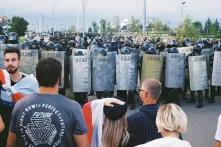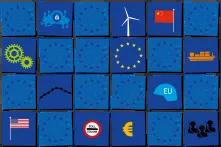
The EU has traditionally been timid about its use of sanctions in foreign policy. Will this change with the current EU leadership’s plans to speak “the language of power”?

The announcement by European Commission President Ursula von der Leyen that hers was going to be a “geopolitical” Commission and the accompanying statement by High Representative Josep Borrell, her team’s foreign policy chief, that Europe needed to learn the “language of power” have generated curiosity on the prospective role of the EU in global geo-economics. Here, the use of economic sanctions is a central element, for they feature the essential components of any geo-economic tool: they entail the alteration of economic flows in order to advance political objectives.
The EU has been issuing sanctions for decades. A comparison of its sanctions practice with those of the U.S., the world’s principal sanctions sender, and the United Nations Security Council, shows that Brussels is more active than New York, and almost as prolific in establishing sanctions regimes as Washington. The EU is by far the regional organisation that imposes sanctions with the highest frequency. Intuitively, the EU’s status as the world’s biggest market would seem to imply that its sanctions are impactful geo-economic tools. As an Asian journalist once adventured in her response to a survey: “I think their economic sanctions could have a lot of power”. In reality, they rarely do. The reasons are twofold: Firstly, European sanctions are seldom economic, and secondly and most centrally, they are rarely employed as instruments of power.
Sanctions under the EU’s Common Foreign and Security Policy (CFSP) are predominantly non-economic in nature because Brussels prefers tailoring sanctions to individuals and the elites that support them. The rationale for this approach is that measures should target those responsible for the condemned policy, sparing the population as a whole – it is called “targeted sanctions”. Thus, most sanctions consist of visa bans and asset freezes of designated individuals. The same rationale prevents the EU from imposing far-reaching measures that would affect the economy as a whole and produce humanitarian consequences, an impact the EU does not want to be responsible for. When restrictions are agreed, they are invariably accompanied by humanitarian exemptions. At the same time, the self-restraint exercised by the EU in limiting the scope of its economic measures ensures that impacts on its own firms remain moderate: Some of them might lose significant trade, but very few will go out of business.
Most centrally, Brussels does not use its sanctions as instruments of power. They are certainly geared at influencing foreign leaders and global events. However, they often respond to the promotion of human rights and democracy, typically in reaction to situations of democratic backsliding. Some sanctions address violent conflict when the UN Security Council is prevented from acting. They are also meant to deter certain practices and forms of behaviour in international life. Importantly, the enactment of sanctions serves the purpose of positioning the EU on the side of its allies in international disputes. In addition, the EU supplements sanctions wielded by the UN Security Council, in particular to stem terrorism or the proliferation of weapons of mass destruction.
Does the new discourse on a geopolitical Commission and its (re-)learning of the “language of power” herald a reorientation of the use of CFSP sanctions? Can sanctions become a geo-economic instrument in the EU’s toolbox? There are signs that the EU is already moving towards a more strategic use of its sanctions policy – or at least, one that approximates its employment as a geo-economic tool. In addition to supporting the sovereignty of post-Soviet states in the face of separatism and foreign encroachment, as it did in Moldova in the 2000s and in Ukraine in 2014, the EU is increasingly moving towards wielding sanctions in support of its own sovereignty. This is most obvious in the approval of its sanctions regime on Turkey, which addresses drilling activities off the coast of one of its member states, Cyprus, affecting waters under its jurisdiction. This new emphasis is also visible in the adoption of horizontal sanctions regimes, a recent trend in the CFSP. In contrast to sanctions regimes focusing on a crises taking place in specific locations, such as the ongoing crisis in Belarus, horizontal sanctions regimes, like the anti-terrorism list are thematic. With the enactment of sanctions against cyber-attacks and the use of chemical weapons, the EU reacted to attacks taking place in their territories or virtual spaces, while leaving open the option of addressing similar malicious actions elsewhere. From this shift in focus from promoting democracy externally to protecting the homeland(s), it is visible that a strategic turn is already underway.
Even more evident are recent moves within the EU institutional machinery. In 2019, the sanctions unit at European External Action Service (EEAS), which used to be under the Directorate for Security Policy and Conflict Prevention, moved up the organigram to report directly to the Secretary General. For its part, the Commission placed its own sanctions in its DG for Financial Stability (FISMA). As recently as in January 2021, the Commission released a communication on fostering European economic and financial resilience launching measures to strengthen implementation and enforcement of EU sanctions. All this suggests that the EU is not just set to continue applying sanctions, but that it will become more vocal and serious about it. One should remember that, until just a few years ago, the EU did not even employ the term “sanctions”, referring to “restrictive measures” instead.
However, part of the answer to our question resides in the transatlantic dimension, which is key to EU sanctions policy. Sanctions constitute a privileged area of transatlantic co-operation: seldom has Brussels imposed sanctions on targets that were not concurrently on a US blacklist. More often than not, Washington takes the initiative. Even though the transatlantic partners often diverge in the nature of the measures and the number of blacklist entries, they often concur in the identification of situations to subject to sanctions, and in the reasons that motivate them. The alignment of its autonomous measures with those of the US allows the EU to position itself as a close ally of the US in international crises around the world. Transatlantic cooperation on sanctions has been subject to a stress test on multiple accounts: Importantly, the extraterritorial effects of US sanctions compel the private sector to comply with US sanctions even if they are not obliged to do so. We are also witnessing increasing divergence about Russia. The disagreement over Iran, in whose context Brussels openly opposed Washington’s withdrawal from the JCPOA, was major. And the US ‘maximum pressure’ campaign amounts to a return to comprehensive sanctions which departs from the European approach of enacting narrow, personalised sanctions targeted at specific elites, and threatens the implementation of humanitarian exemptions which are dear to the EU. Still, during the presidential term of Donald Trump, the reflex of coordination did not subside. Alignment continued, and even deepened: the EU now has sanctions on two Latin American targets, Nicaragua and Venezuela, and has recently enacted a human rights sanctions regime modelled on the US “Global Magnitsky” Act.
The place that the new US administration reserves for Europe in its sanctions policy will bear important implication for EU sanctions policy. A US administration that consults on sanctions policies with European allies and, most importantly, that limits the extraterritorial effects on Europe will allow transatlantic co-operation to flourish. By contrast, a US administration that continues its predecessor’s course will encounter an increasingly cautious EU. If Brussels continues to find itself at the receiving end of US sanctions, it will become less accommodating – if not more “transactional” – when Washington encourages alignment with its sanctions. After all, sanctions entail costs for all parties involved, not least for leaders who need to explain to their constituencies why they align with sanctions by the same foreign power that targets them.


